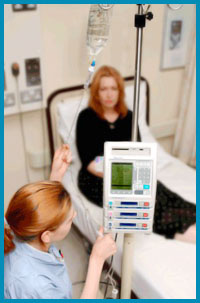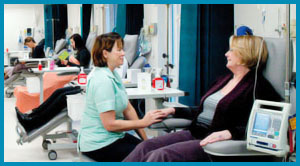 |
| |
0 84204 00896
0 89810 30878 |
| |
| 0 70447 88389 |
|
 |
|
|
|
|
|
|
| |
| |
| Chemotherapy : |
| ----------------------------------------------------------------------------------------------------------------------------------------------------------------------------------------------------------------------- |
| |
|
Chemotherapy, or "chemical treatment," has been around since the days of the ancient Greeks. However, chemotherapy for the treatment of cancer began in the 1940s with the use of nitrogen mustard. Since then, in an attempt to discover effective chemotherapy, many new drugs have been developed and tried.
Chemotherapy treatment uses medicine to weaken and destroy cancer cells in the body, including cells at the original cancer site and any cancer cells that may have spread to another part of the body. Chemotherapy, often shortened to just "chemo," is a systemic therapy, which means it affects the whole body by going through the bloodstream.
There are quite a few chemotherapy medicines. In many cases, a combination of two or more medicines will be used as chemotherapy treatment for different cancers. |
|
| |
| |
| |
| How Chemotherapy Work : |
| ----------------------------------------------------------------------------------------------------------------------------------------------------------------------------------------------------------------------- |
| |
|
Chemotherapy medicines prevent cancer cells from growing and spreading by destroying the cells or stopping them from dividing.
Cancer cells tend to grow and divide very quickly with no order or control. Because they're growing so fast, sometimes cancer cells break away from the original tumor and travel to other places in the body. Chemotherapy weakens and destroys cancer cells at the original tumor site and throughout the body.
Most normal cells grow and divide in a precise, orderly way. Still, some normal cells do divide quickly, including cells in hair follicles, nails, the mouth, digestive tract, and bone marrow (bone marrow makes blood cells). Chemotherapy also can unintentionally harm these other types of rapidly dividing cells, possibly causing chemotherapy side effects. |
 |
|
| |
| |
| |
| For example chemotherapy is used to treat : |
| ----------------------------------------------------------------------------------------------------------------------------------------------------------------------------------------------------------------------- |
| |
 |
• early-stage invasive breast cancer to get rid of any cancer cells that may be left behind after surgery and to reduce the risk of the cancer coming back
• advanced-stage breast cancer to destroy or damage the cancer cells as much as possible
When treating early-stage breast cancer, it's fairly common for chemotherapy to be given after surgery, as soon as you recover. Doctors call this "adjuvant" chemotherapy because it's given in addition to surgery, which is considered the primary treatment. |
|
| |
| In some cases, chemotherapy is given before surgery to shrink the cancer so that less tissue has to be removed. When chemotherapy is given before surgery, it's called "neoadjuvant" chemotherapy. |
| |
| In many cases, chemotherapy medicines are given in combination, which means you get two or three different medicines at the same time. These combinations are known as chemotherapy regimens. In early-stage breast cancer, standard chemotherapy regimens lower the risk of the cancer coming back. In advanced breast cancer, chemotherapy regimens make the cancer shrink or disappear in about 30-60% of people treated. Keep in mind that every cancer responds differently to chemotherapy. |
| |
| |
| |
|
| |
|
|
|
|